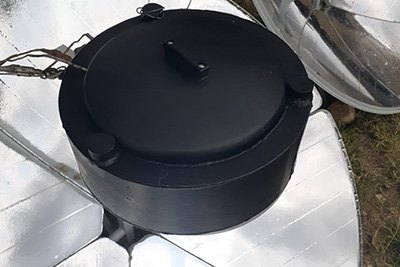 Dr Katlego Aubrey Lentswe
Dr Katlego Aubrey Lentswe n NWU researcher has a solution to the one problem faced by solar cookers: what to do when the sun does not shine.
Dr Katlego Aubrey Lentswe from the School of Electrical, Electronic and Computer Engineering conducted his study as part of his PhD thesis, titled "Performance enhancement of parabolic dish solar cookers using thermal energy storage".
The research focused on characterising, enhancing, and optimising the performance of parabolic solar cookers through the integration of thermal energy storage (TES) systems. By developing cooking pots filled with TES materials, the study demonstrated the effectiveness of using these pots in a direct storage mode with parabolic dish solar cookers.
After four hours of operation, the cooking pots reached a constant temperature of approximately 132,7 °C, which is sufficient for cooking various foods. This, he says, highlighted the potential of TES-integrated solar cookers.
"The integration of TES with solar cookers addresses the limitation of these cookers by enabling them to store and use energy during non-sunny periods. This advancement extends the usability of solar cookers and enhances their practicality and efficiency for continuous daily use, making them a more viable and sustainable option for cooking in both urban and rural areas," says Dr Lentswe.
Stored energy has potential beyond cooking
He says the implementation of his findings was not limited to cookers, and there is the potential to use stored energy for other domestic applications such as water heating, showcasing the versatility and utility of this technology.

The parabolic dish solar cookers can be
used to store thermal energy.
He believes that continued research and optimisation could improve the adoption and effectiveness of solar cooking technologies in disadvantaged communities. This would promote healthier cooking methods and contribute to environmental conservation.
"Solar energy provides a clean and sustainable alternative for cooking, which is beneficial in developing countries where traditional methods like burning wood and dung are still prevalent," Dr Lentswe explains.
"These traditional methods pose health risks, including eye and lung diseases, which occur among rural women who handle the cooking."
He adds that solar cookers offer a solution for regions with high solar radiation, and that they are environment-friendly, user-friendly and inexpensive to maintain. They can also contribute to the reduction of deforestation.
Despite their benefits, until now solar cookers have had limitations due to their inability to operate during non-sunshine periods.
Dr Lentswe's research addresses this challenge by integrating TES systems that store thermal energy for use during periods without sunlight, such as at night.
These systems enable solar cookers to function continuously, storing energy for dual purposes like cooking and water heating. However, he notes that research on the combination of solar cookers and TES, particularly in the indirect mode for dual purposes, remains limited.
Dr Lentswe's study marks a step forward in the field of sustainable cooking and other heating technologies, with the potential to transform the daily lives of millions of people, particularly in developing regions.
|